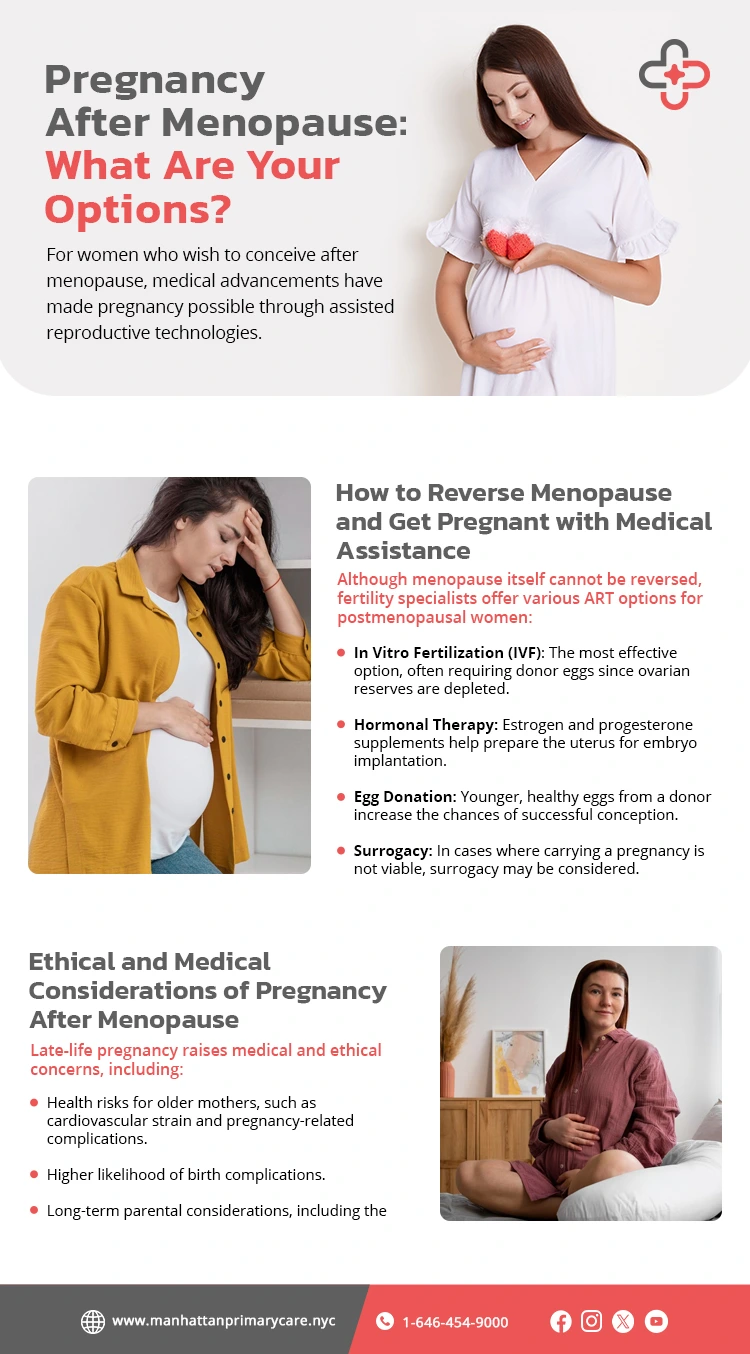Many women approaching menopause wonder if pregnancy is still possible, either naturally or with medical assistance. The idea of conceiving after menopause is often surrounded by myths and misunderstandings. While menopause marks the natural end of a woman’s reproductive years, medical advancements in assisted reproductive technologies (ART) have expanded possibilities for those who wish to conceive later in life.
Can You Get Pregnant After Menopause? Understanding Fertility Changes
No, natural pregnancy after menopause is not possible. This section explains the biological and hormonal changes that lead to infertility post-menopause and explores available reproductive options.
Defining Perimenopause, Menopause, and Postmenopause
Menopause is a natural biological process that marks the cessation of menstrual cycles, typically occurring between the ages of 45 and 55. It is preceded by perimenopause, a transitional phase characterized by hormonal fluctuations and irregular ovulation. Postmenopause is the stage that follows menopause, during which reproductive function is permanently ceased.
Hormonal Changes and Their Impact on Fertility
During perimenopause, declining levels of estrogen and progesterone lead to reduced ovarian function. As a result, the quantity and quality of eggs decline significantly. By the time menopause is reached (defined as 12 consecutive months without a menstrual period), ovulation ceases entirely, making natural conception virtually impossible.
Do You Still Have Eggs After Menopause?
Women are born with a finite number of eggs, and this ovarian reserve gradually depletes over time. By menopause, nearly all viable eggs are exhausted. While some residual follicles may remain, they are typically non-functional and incapable of ovulation.
Can You Get Pregnant During Perimenopause? Risks and Possibilities
Pregnancy during perimenopause is possible but less common, and it carries higher health risks compared to earlier reproductive years.
Ovulation and Pregnancy During Perimenopause
Although ovulation becomes irregular during perimenopause, pregnancy is still possible if viable eggs are released and fertilized. Since ovulation is unpredictable, some women may conceive naturally during this phase, though the likelihood is significantly lower than in earlier reproductive years.
Pregnancy Risks and Contraception Considerations
Perimenopausal pregnancies carry increased risks, including:
- Higher risk of miscarriage due to chromosomal abnormalities.
- Complications such as gestational diabetes and hypertension.
- Increased likelihood of preterm birth and low birth weight.
- Higher risk of requiring cesarean delivery.
Since ovulation is still possible until menopause is confirmed, contraception remains necessary for those avoiding pregnancy. Regular Health Screenings help monitor overall health and detect any concerns early.
How Long After Menopause Can You Get Pregnant Naturally?
Natural conception after menopause is extremely rare and unlikely, but medical interventions may provide alternatives for those seeking pregnancy.
The Likelihood of Natural Conception Post-Menopause
Once menopause is reached, the ovaries no longer release eggs, making natural pregnancy nearly impossible. However, extremely rare cases of spontaneous postmenopausal pregnancy have been reported, typically involving residual ovarian function or misdiagnosed menopause.
Can Menopause Be Reversed?
While some experimental treatments explore hormonal therapies to rejuvenate ovarian function, menopause is largely considered irreversible. Most postmenopausal pregnancies occur through medical intervention, particularly in vitro fertilization (IVF) using donor eggs.
Pregnancy After Menopause: What Are Your Options?
For women who wish to conceive after menopause, medical advancements have made pregnancy possible through assisted reproductive technologies.


How to Reverse Menopause and Get Pregnant with Medical Assistance
Although menopause itself cannot be reversed, fertility specialists offer various ART options for postmenopausal women:
- In Vitro Fertilization (IVF): The most effective option, often requiring donor eggs since ovarian reserves are depleted.
- Hormonal Therapy: Estrogen and progesterone supplements help prepare the uterus for embryo implantation.
- Egg Donation: Younger, healthy eggs from a donor increase the chances of successful conception.
- Surrogacy: In cases where carrying a pregnancy is not viable, surrogacy may be considered.
Ethical and Medical Considerations of Pregnancy After Menopause
Late-life pregnancy raises medical and ethical concerns, including:
- Health risks for older mothers, such as cardiovascular strain and pregnancy-related complications.
- Higher likelihood of birth complications.
- Long-term parental considerations, including the ability to raise a child later in life.
Signs of Pregnancy After Menopause: What to Look For
Recognizing pregnancy after menopause can be challenging, as symptoms often overlap with menopausal changes.
Differentiating Pregnancy Symptoms from Menopausal Changes
Menopausal symptoms such as hot flashes, missed periods, and hormonal shifts can mimic early pregnancy signs. Women experiencing:
- Nausea and fatigue
- Breast tenderness
- Unexplained weight gain should take a pregnancy test to confirm their status.
Conclusion
While natural conception after menopause is rare, modern medicine offers hope for those who still dream of motherhood. Women considering postmenopausal pregnancy should consult a fertility specialist to assess their options and potential risks. At Manhattan Primary Care, we offer expert guidance and personalized care to support women in their reproductive choices. Our Women’s Health Services provide comprehensive support tailored to individual needs. If you’re exploring fertility treatments, seek professional guidance to make informed decisions about your path to motherhood.
Frequently Asked Questions
Can menopause symptoms mimic pregnancy?
Yes, both can cause missed periods, fatigue, and mood swings, but only pregnancy results in fetal movement and a positive test.
How does postmenopausal pregnancy impact long-term health?
It increases risks of osteoporosis, cardiovascular issues, and hormonal imbalances, requiring close monitoring.
Can natural remedies restore fertility after menopause?
No, but supplements and lifestyle changes may support uterine health for assisted pregnancy.
Can menopause cause pregnancy-like cravings?
Yes, hormonal fluctuations from menopause or fertility treatments can mimic cravings and mood swings.
Can menopause be delayed to extend fertility?
Lifestyle habits and hormone therapy may slightly delay menopause but won’t restore fertility.
Disclaimer
This blog is for informational & educational purposes only and does not intend to substitute any professional medical advice or consultation. For any health-related concerns, please consult with your physician, or call 911.
